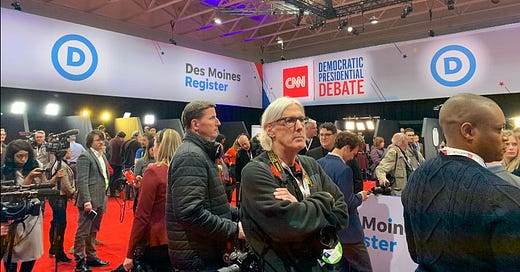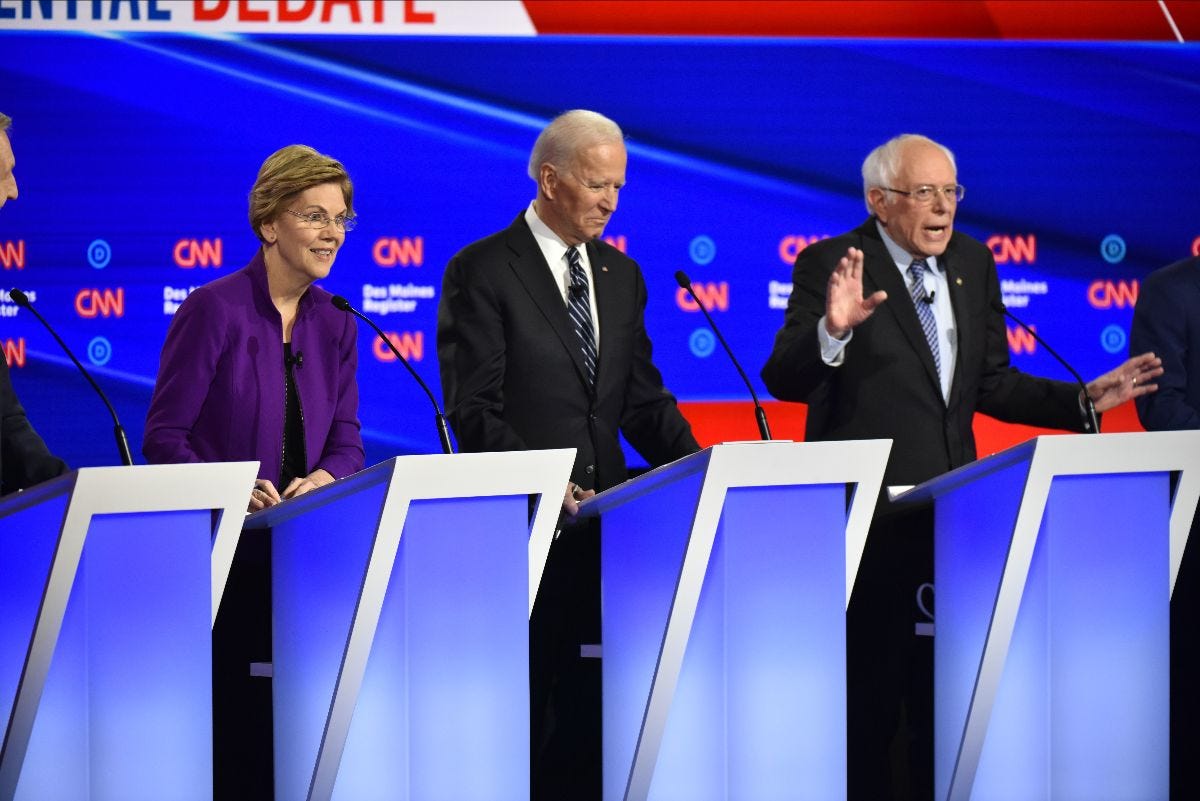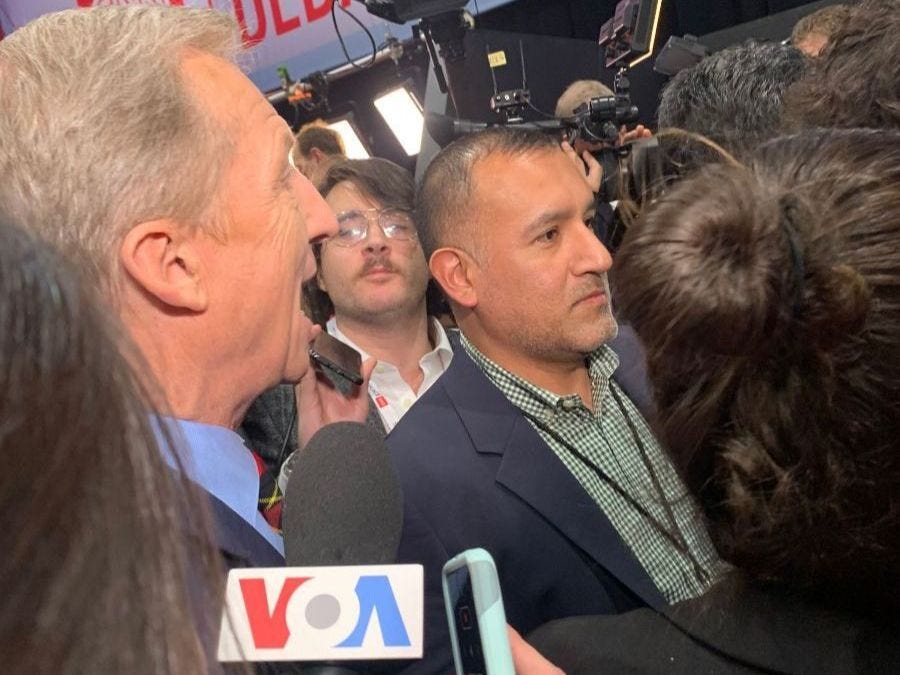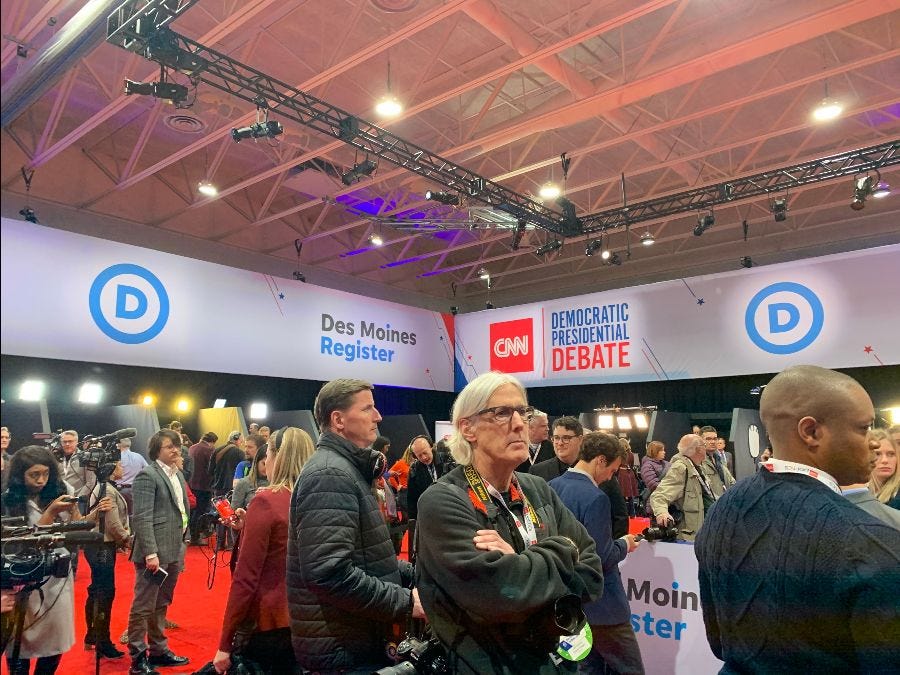I'm Gabe Fleisher, reporting live from Des Moines, Iowa. It’s Wednesday, January 15, 2020. 19 days until the Iowa caucuses. 293 days until Election Day. Have any comments, questions, suggestions, or tips? Email me at gabe@wakeuptopolitics.com!
Thanks to those of you who have already subscribed to my brand-new podcast with St. Louis Public Radio! For those of you who haven't, click here to learn more. And now, here's my special on-the-ground recap from last night's Democratic debate in Iowa:
DEMOCRATIC DEBATE: IOWA 2020
Democrats clash over war powers, gender in final debate before Iowa caucuses
DES MOINES — The six leading Democratic presidential candidates had a final opportunity to make their case to Iowa voters in primetime on Tuesday, with a televised debate less than three weeks to go until the state's crucial caucuses kick off the 2020 primary calendar.
The most closely watched exchanges were between progressive Sens. Bernie Sanders of Vermont and Elizabeth Warren of Massachusetts, whose unspoken non-aggression pact had betrayed signs of fraying in the days leading up to the debate, as they sparred over a volunteer script circulated by the Sanders campaign and differing accounts of their private meeting in 2018. Despite predictions of an all-out brawl between the two senators, Sanders and Warren mostly refrained from setting off fireworks throughout the night, although they ultimately maintained their disagreement about what was said in the 2018 sit-down.
Sanders denied Warren's claim (first reported by CNN) that he told her at the time that a woman could not be elected president. "I didn't say it. And I don't want to waste a whole lot of time on this, because this is what Donald Trump and maybe some of the media want," he said. "Anybody knows me knows that it's incomprehensible that I would think that a woman cannot be president of the United States."
Warren, in turn, declined to go after Sanders personally but instead responded to the broader question that has hung over her campaign concerning a woman's electability. "Look at the men on this stage. Collectively, they have lost 10 elections. The only people on this stage who have won every single election that they've been in are the women," she said, referring to herself and Minnesota Sen. Amy Klobuchar.
"So true," Klobuchar chimed in.
Photo by CNN
For the first time in the cycle, discussions of foreign policy took center stage on Tuesday, as the candidates discussed their views on war powers amid President Donald Trump's killing of a top Iranian commander earlier this month.
Sanders took the opportunity to continue his recent criticism of former Vice President Joe Biden — the national polling leader — over the onetime senator's 2002 vote in favor of the Iraq War. "Joe and I listened to what Dick Cheney and George Bush and [Donald] Rumsfeld had to say," Sanders intoned. "I thought they were lying. I didn't believe them for a moment. . . I did everything I could to prevent that war. Joe saw it differently."
In response, Biden admitted that he had made a "mistake" by supporting the war, although he argued that the U.S. should maintain a military presence in the region going forward, while Sanders and Warren called for complete removal of American troops.
"I think it's a mistake to pull out the small number of troops that are there now to deal with ISIS," Biden said.
The debate stage was the smallest it has ever been in the 2020 Democratic cycle, with just six candidates competing for attention. With much of the attention showered on tensions between the progressives, the more moderate candidates such as Biden and former South Bend Mayor Pete Buttigieg mostly flew under the radar and emerged unscathed. (Rounding out the stage, billionaire Tom Steyer spoke for a scant 12 minutes in the two-hour affair.)
Biden focused on emphasizing the electability case that is at the center of his campaign. "I've been the object of [Trump's] affection now more than anybody else on this stage," he argued. "I've taken all the hits he can deliver and I'm getting better in the polls. . . I have support across the board and I'm not worried about taking on Donald Trump at all."
Buttigieg, meanwhile, sustained few attacks from his opponents but did receive a pointed question from a moderator about his dearth of support among African-American voters. "The biggest mistake we can make is to take black votes for granted, and I never will," he promised. "The reason I have the support I do is not that any voter thinks I'm perfect, it's because of the work that we have done facing some of the toughest issues."
As the days tick closer to the Iowa caucuses, most polls show a virtual dead heat between Biden, Buttigieg, Sanders, and Warren in the state. But as the candidates on stage Tuesday mostly declined to make clear contrasts between each other (and in the cases of Biden and Buttigieg, stayed silent and unmentioned for long stretches of the night), it is likely little changed after the primetime event.
Inside the Spin Room
But the two-hour debate was only the beginning of the night for the candidates and journalists gathered at Drake University in Des Moines on Tuesday. As the six presidential aspirants began to deliver their closing statements, a group of students chosen to follow the candidates through the Spin Room had already gathered, hoisting signs labeled with the names of their assigned contender.
One looming question hung over the Spin Room all night: what did Sens. Bernie Sanders and Elizabeth Warren say to each other in a seemingly tense conversation just after the debate ended, in which Warren appeared to rebuff her competitor's offer of a handshake. Although the two left-leaning senators skipped the Spin Room, Tom Steyer — who did make an appearance — was chased by reporters, beseeching him to divulge the contents of the brief exchange. (He was seen on camera standing right next to the pair for most of the encounter.)
"I was just saying good night to the two of them," he insisted. "I didn't hear anything."
"Do you think a president should be more observant to hear a conversation happening right in front of them?" a reporter from the New York Times asked, half-jokingly. "Shouldn't a president be able to hear those types of things, happening three feet away from their face?"
Steyer smiled and laughed, but wouldn't comment further on what he had witnessed.
Neither Sanders nor Warren themselves made Spin Room appearances on Tuesday night, but Sanders' campaign co-chair Nina Turner did take questions, expressing frustration as she received question after question about the tensions between the two progressive senators.
After Turner characterized it as an "absolute" that Sanders did not tell Warren in their 2018 meeting that a woman couldn't be elected president, Wake Up To Politics pressed her on whether that meant Warren was lying when she claimed the opposite. "Senator Bernie Sanders answered the question. He said he did not say it. Case closed," Turner said, dodging the question.
Turner also declined to give an answer to the night's most-asked question: "I'm not sure what she said, but you can read the body language. Obviously, the conversation was not pleasant."
"How would you characterize the relationship between Senator Sanders and Senator Warren?" another reporter asked.
"I don't know. You know what? I really don't care. . . That's small stuff right there," Turner responded. "People are actually suffering in this country and we're going back and forth about what one senator said to another senator."
For the most part, candidates spurned the scrums of reporters who populated the Spin Room, opting instead to shuttle between the various cable news sets arranged nearby. As a result, journalists spent much of the night in stampeding herds following the candidates between TV hits, finding little success in coaxing the White House hopefuls into answering spontaneous questions.
"Are you ever going to answer a question in a Spin Room?" one reporter asked Pete Buttigieg as an aide muscled him and his husband Chasten behind the curtain, after appearances on MSNBC and Fox News. The former South Bend mayor stayed mum.
However, surrogates for most of the campaigns did roam throughout the room, offering their best "spin" on how the night went for their chosen candidate. Perhaps the highest-profile surrogate in the room was former HUD Secretary Julián Castro, himself a former presidential contender, who has endorsed Elizabeth Warren since ending his own campaign.
"People of different backgrounds are gravitating toward her message here in the closing days of this caucus," Castro told Wake Up To Politics of what he had seen on the Iowa campaign trail with his rival-turned-ally, "and so I feel good about her ability not only to do well in Iowa but also to go on beyond that in this campaign and win the nomination and to defeat Donald Trump and usher in a stronger and better and brighter America on January 20, 2021."
Instead of sending any prominent endorsers, three top advisers to Joe Biden — Kate Bedingfield, Anita Dunn, and Symone Sanders held court in the Spin Room — to represent the former vice president's campaign.
"I thought he had a strong debate," Dunn, a senior adviser to Biden and former White House communications director, said in an interview with Wake Up To Politics. "There were six candidates on stage but only one commander-in-chief."
Dunn also downplayed the importance of the dawning Iowa caucuses, insisting that Biden would be "competitive" but denying that a loss in the state would halter his campaign. "The first four states are all important," she said. "Iowa is the beginning but not the end. It's the first state but not the last."
As the clock neared midnight, the cable news stations started packing up their sets and reporters began decamping to their hotels as the Spin Room emptied out. When it became clear that few candidates were going to engage with the assembled reporters, the mood turned somewhat sardonic.
As an aide attempted to rush Tom Steyer out, he did stop to answer one more question from a reporter, focused not on his foreign policy stances but his fashion choices.
"Why do you always wear the same tie?" the reporter asked.
When Steyer responded that the tie was "bright, colorful, and bold," another journalist shot back, "But aren't there different ties that are bright?"
Soon, Steyer was out the door. The spinning was done for the night.
That's a wrap on my Democratic debate coverage, live from Des Moines. But there will be more coming in tomorrow's newsletter, including reporting from a local stop with former Vice President Joe Biden today and an interview with legendary Iowa pollster Ann Selzer. Thank you to those of you who have donated to support Wake Up To Politics: you make trips like this one possible.










